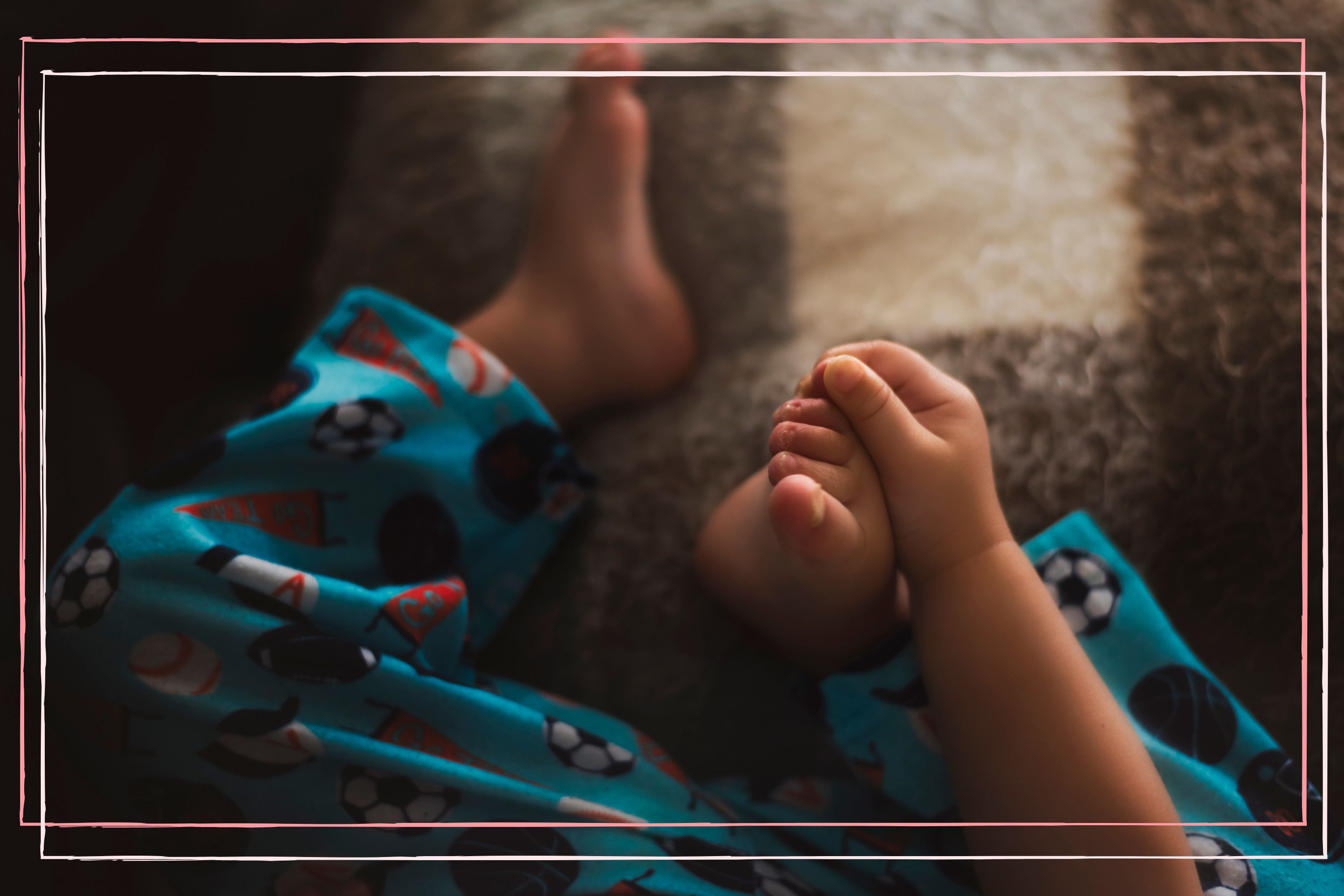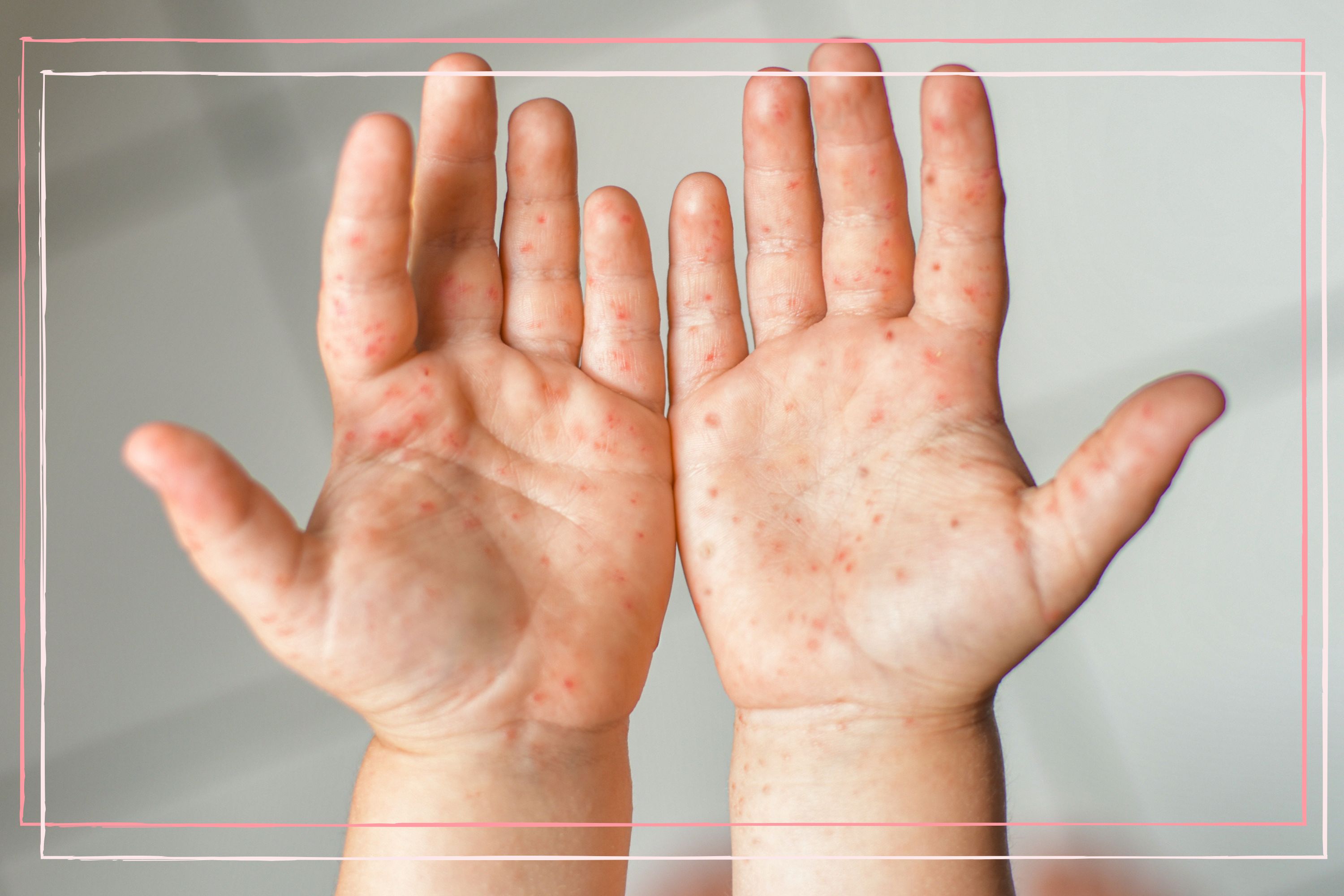What to do if your child has hand, foot and mouth disease and GP advice on precautions to take while pregnant
Advice direct from doctors on what to do if your child catches hand, food and mouth disease, how to soothe symptoms and when your child can return to school or daycare after the illness

Hand, foot and mouth disease symptoms are usually pretty easy to spot in children because, as its name suggests, the rash that it causes is normally confined to a person’s hands and feet.
Although hand, foot and mouth does not look very pleasant and the mouth ulcers it causes can be very painful for your child, thankfully the illness usually doesn’t require a trip to the doctors and will clear up on its own in up to 10 days.
We spoke to Dr Stuart Sanders, GP at The London General Practice, Consultant Practitioner Dr Hussain Ahmad and NHS GP Thuva Amuthan about what to do if your child catches hand, foot and mouth; and they answered some of the most frequently asked questions about the disease, including what to do if you encounter hand, foot and mouth while pregnant.
The information in this article is for general purposes only and does not take the place of medical advice. It is essential to be guided by your GP and take note of official NHS advice. You should immediately seek medical attention if symptoms worsen or you are concerned about your child. If you are unsure, concerned about their symptoms or a rash that has appeared, then it is crucial to seek personalised advice from a doctor as soon as possible. As a parent, you know your child better than anyone and you should always trust your own judgement. If you are at all in doubt and you're worried about your child's symptoms, you should contact your GP.
What is hand, foot and mouth disease (HFMD)?
"Hand, foot and mouth disease is caused by a virus. It is a common illness in childhood," NHS GP Thuva Amuthan says. Hand, foot and mouth disease is also very contagious, which is why it often spreads quickly in nurseries and schools.
GP Dr Stuart Sanders explains that HFMD, "is a minor self limiting disease" which means that it is one that usually resolves on its own and will not have a long-term or harmful effect on a person's health.
HFMD usually starts with symptoms similar to a common cold such as a sore throat or a temperature, as explained by Dr Sanders: "it starts with a temperature that we would associate with most children's infections. They then develop spots on their hands and feet which do not cause much trouble, but there are blisters in the mouth which can be painful and make feeding or eating difficult."
GoodtoKnow Newsletter
Parenting advice, hot topics, best buys and family finance tips delivered straight to your inbox.
The NHS states that hand, foot and mouth, "usually gets better on its own in 7 to 10 days."

What should you do if your child contracts hand, foot and mouth?
If your child comes down with hand, foot and mouth, Dr Sanders advises firstly that you should, "keep them at home until they have recovered and treat their symptoms."
He also states that it is important to make sure that your child stays hydrated, even if they don’t feel like eating or drinking, "the most important thing is to make sure that they have an adequate fluid intake so they do not become dehydrated." Children can often stop eating and drinking because their mouths are so sore. Try getting them to take sips of water through a straw if possible and avoid acidic drinks, like fruit juices. If you think your child is dehydrated and they are not passing urine as often as usual, you should contact your GP.
You should always inform your childcare provider immediately if your child has had hand, foot and mouth. This is so that they can let other parents know that there has been a case in the setting.
Consultant Practitioner Dr Hussain Ahmad explains that while you usually don’t need to see your GP for hand, foot and mouth, you should make an appointment if your child doesn’t start to get better after 7-10 days, "You don't need to see a doctor if your child has hand, foot and mouth as it should pass on its own within a week. If your child is still suffering after 10 days or so, you should book an appointment with your GP to make sure it isn't something else."
You should also make an appointment to see your GP straight away if your child has a very high temperature, or feels hot and shivery. As a parent, you know your child better than anyone and you should always trust your own judgement. If you are at all in doubt and you're worried about your child's symptoms, you should contact your GP.
How to soothe a child with hand, foot and mouth disease
Dr Amuthan says, "Hand, foot and mouth disease gets better by itself in 7 to 10 days in most cases. Rest, good hydration, and a soft diet are essential to recovery. Simple analgesia (medication that acts to relieve pain) like paracetamol can help with the pain and temperature."
Dr Sanders agrees that you can, “give them Paracetamol or Ibuprofen liquid, dose as appropriate to their age and size, if the mouth ulcers or the raised temperature is causing distress," but he also cautions, "do not give aspirin [to children] under 16 years." Dr Sanders also suggests, "soothing gels such as Bonjela (paediatric preparations)" to help soothe the mouth ulcers caused by hand, foot and mouth. Ask a pharmacist for advice about which treatments and pain relief options are suitable for children.
While your child is at home and feeling unwell Dr Ahmad also recommends, "Keep your child hydrated and comfortable while they get over the worst of their symptoms. They might not feel like eating much, so try not to worry about providing a balanced diet and instead let them eat when they feel like it and whatever they feel they can manage. Hand, foot and mouth blisters can be quite painful, so avoid acidic food, like oranges or tomatoes."
Dr Sanders also recommends, "easy to eat foods such as ice cream and yoghurt" to help your child eat while they are uncomfortable and may not feel like eating much.
How long is a child contagious with hand, foot and mouth and how do you know when they are no longer contagious?
A child with hand, foot and mouth disease is actually most contagious just before their symptoms appear, right up until they’re feeling better. The most important time to keep your child at home and away from others who might catch the disease is when they are feeling unwell and while they have a temperature.
Dr Amuthan says, "Coughs, sneezes, poo and any fluid from blisters can easily pass it onto others. You can be contagious a few days before you develop any symptoms. You are most contagious in the first 5 days. Children should stay at home whilst they are feeling unwell."
Dr Sanders states, "A child is contagious until their temperature is normal, approximately between two to four days."
Dr Ahmad explains, "As a general rule, once the high temperature has passed and blisters have dried up, the risk of spreading hand, foot and mouth is reduced significantly."
"You are usually most contagious for about one week, but the virus can remain in the body and be passed on for weeks after symptoms have disappeared, so you need to be cautious with who you see and how much contact your child has with them," Dr Ahmad adds.
"You should keep your child away from other children and pregnant women until they're no longer contagious."
When can a child with HFMD return to school or daycare?
"Children with HFMD can return to school or daycare when their temperature is normal and the child is feeling better," Dr Sanders states. However, he adds that schools or daycare may have specific rules or protocols for hand, foot and mouth and so you should check with them first before your child returns. Some nurseries and schools may ask that children do not return until the rash has completely gone, for example.
NHS advice states that you should keep your child off school or nursery while they're feeling unwell. But as soon as they're feeling better, they can go back to school or nursery. There's no need to wait until all the blisters have healed.
Can adults catch hand, foot and mouth from a child and do parents need to quarantine if their child has HFMD?
Hand, foot and mouth disease is highly contagious and it is possible for a parent to get it from a child. However, Dr Sanders says this happens, "very unusually because they will probably have immunity from previous exposure." He also told us that, "there is no need to quarantine" if your child has HFMD.
Dr Ahmad says, "Adults can catch HFMD from their child, but it's less common, so you shouldn't let it stop you from taking proper care of your child and providing comfort when they need it. As long as you regularly wash your hands and avoid sharing drinks or food, you would be very unlucky to catch it!"
How to avoid parents and siblings catching hand, foot and mouth from an infected child
According to information from the National Institute for Health and Care Excellence (NICE), "spread within families is common." However, it also adds that some adults are immune following previous exposure during childhood and Dr Sanders also told us that it, “would be unusual” for parents to catch HFMD from an infected child.
Nevertheless, as it is possible for adults to catch HFMD and it is very contagious amongst children (putting siblings at risk of catching it from an infected child) there are ways to try and reduce the risk of hand, foot and mouth spreading through your household.
The best way to reduce the risk of getting hand, foot and mouth is through good hygiene practices. These include:
- Follow the best hygiene practices of washing your hands often with soap and water
- Use tissues to trap germs when you cough or sneeze and disposing of them immediately
- Do not share towels or household items like cups, cutlery or crockery
- Disinfect toys after use and limit the sharing of toys between children while a child is still infectious
- Wash soiled bedding and clothing on a hot wash
Dr Sanders also adds that in some circumstances, "isolation of the [infected child] would be important if either parent is immunocompromised," and you should also keep your child away from pregnant women until they're no longer contagious.
Do you need to take extra precautions if you are pregnant?
Catching hand, foot and mouth while pregnant should be avoided if possible.
"Pregnant women should be cautious around HFMD because the fever associated with it can cause complications at the beginning and end of pregnancy," cautions Dr Ahmad.
Dr Amuthan explains, "It is best to avoid close contact with anyone that has the disease if you are pregnant. Although very rare, having a high temperature in your first three months can lead to a miscarriage. Your baby can be born with a mild form of the disease if you get it just before giving birth."
If you're pregnant and get hand, foot and mouth disease, you should make an appointment to see your GP straight away.
Doctors answer your frequently asked questions about hand, foot and mouth disease
Do baths help hand, foot and mouth disease?
Yes, baths could help with hand, foot and mouth disease.
Dr Ahmad advises, "Baths can help soothe the symptoms, particularly if their skin is itchy. Try to keep the water lukewarm to avoid inflaming the blisters and making them worse."
Should siblings of a child with hand, foot and mouth go to school?
Yes, siblings of a child with HFMD can go to school like normal. Dr Sanders says this is because, "they do not present an infection risk unless they have the infection."
Dr Ahmad adds, "Siblings without symptoms should continue to go to school, but keep a close eye on them as they are more likely to catch it."
Do you have to disinfect everything at home after a child has hand, foot and mouth?
"It's not essential, but disinfecting common areas and items, especially toys and surfaces the child has touched, can help prevent the spread of HFMD, especially if you have other children in your home," says Dr Ahmad.
Dr Sanders also adds that while cleaning everything at home after a child has hand, foot and mouth is good advice, as, "the Enterovirus is in the faeces, hand washing discipline after [going to the] toilet is very important."
So making sure your little one washes their hands after going to the toilet is really important. Plus, make sure you wash your hands thoroughly after changing nappies to help reduce the risk of spreading the disease.
Can I hug my child with hand, foot and mouth?
"Adults can catch HFMD from their child, but it's less common, so you shouldn't let it stop you from taking proper care of your child and providing comfort when they need it," answers Dr Ahmad.
Can hand, foot and mouth live on clothes?
Yes, hand, foot and mouth can live on clothes, so it's important to wash them at a high temperature after use and avoid sharing clothes amongst an infected child and their siblings.
"The virus that causes HFMD can live on clothes or towels for a short period, so avoid sharing towels and wash clothes daily until the child has recovered," advises Dr Ahmad.
Can a child catch hand, foot and mouth more than once?
Yes, a child can catch HFMD more than once. Dr Ahmad explains that this is because, "there are multiple viruses that cause it."
Dr Sanders says that children only catch hand, foot and mouth more than once, "very occasionally. For example, if the first infection was due to Coxsackie virus, they would have no immunity to Enteroviruses."
Disclaimer
The information on GoodTo.com does not constitute medical or other health advice or diagnosis and should not be used as such. Although GoodtoKnow consults a range of medical experts to create and fact-check content, this information is for general purposes only and does not take the place of medical advice. Always seek the guidance of a qualified health professional or seek urgent medical attention if needed.
Our experts

Dr Sanders is a registered medical practitioner who graduated at the University of Leeds where he was awarded the Medical School prize in paediatrics. He subsequently gained diplomas in child health and obstetrics and has been presented with the Huntarian Society and The Independent Doctors Federation medals. Dr Sanders has considerable experience in family medicine and has been awarded the Fellowship of the Royal College of General Practitioners by Assessment.

Dr Hussain Ahmad (MUDr/MD) has over 10 years of experience working with patients across Europe and, most recently, in the North of England. He is an experienced hospital doctor working primarily in A&E in the North West.

Dr Thuva Amuthan is an NHS GP in Birmingham, with a special interest in dermatology and minor surgery. He is also the founder of Dr. Derme Skin and Aesthetics Clinic and specialises in cosmetic skin treatments and aesthetics.

Emily-Ann Elliott is an experienced online and print journalist, with a focus on health, travel, and parenting. After beginning her career as a health journalist at The Basingstoke Gazette, she worked at a number of regional newspapers before moving to BBC News online. She later worked as a journalist for Comic Relief, covering stories about health and international development, as well as The Independent, The i, The Guardian, and The Telegraph. Following the birth of her son with neonatal meningitis, Emily-Ann has a particular interest in neonatal health and parental support. Emily-Ann has a degree in English literature from the University of Newcastle and has NCTJ and NCE qualifications in newspaper journalism.
